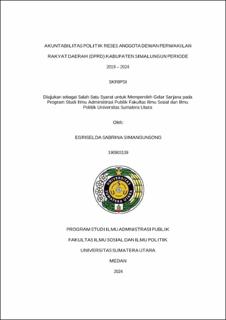| dc.description.abstract | The implementation of Recess or meetings of council members with their constituents is also stated in Law No. 17 of 2014 article 234 concerning the Composition of the People's Consultative Assembly, that the DPRD has an obligation to absorb and collect constituent aspirations through periodic working visits, accommodate and follow up on public complaints. The Simalungun Regency DPRD during the implementation of the recess experienced several obstacles in the implementation of the recess, including recess activities tending to be considered mere formalities without adequate follow-up to public aspirations, lack of transparency in planning, distribution of the recess budget, and implementation of recess activities that do not accommodate public aspirations. Several policies or assistance implemented through recess activities also tend to be selective and are sometimes used for certain political interests without considering the actual needs of the community. The purpose of this study is to determine the extent of the political accountability of the recess of the Members of the Regional People's Representative Council (DPRD) of Simalungun Regency for the 2019-2024 period. The benefits of this study are to provide benefits to readers as information related to measuring the Political Accountability of the Recess of the Members of the Regional People's Representative Council (DPRD) of Simalungun Regency for the 2019-2024 period.
The method used in this study is a descriptive method with a qualitative approach. To obtain data and information, researchers conducted interviews with members of the Simalungun Regency DPRD and also with the community. In addition, researchers also conducted observations and documentation to answer research problems. This study uses indicators according to William Dunn, namely Agenda Preparation (Policy Agenda), Policy Adaption (Policy Adaption), and Policy Implementation (Policy Implementation).
Basedhonhthehresearch conducted, ithcan be seenhthat thehpolitical accountability of the Simalungun Regency DPRD recess policy in implementing the recess reviewed from the policy agenda indicator clearly shows that each member of the Simalungun Regency DPRD has been running well. Where this can be seen from the real evidence of the results of recess activities that are able to accommodate community aspirations, are able to repair the Bah Bolon Bridge which was previously damaged, and are able to carry out recess activities 3 times a year. However, there are several factors that hinder the Simalungun Regency DPRD in implementing this recess program, thus giving rise to less favorable opinions regarding the accountability given by the community to the Simalungun Regency DPRD members regarding the recess program. | en_US |


